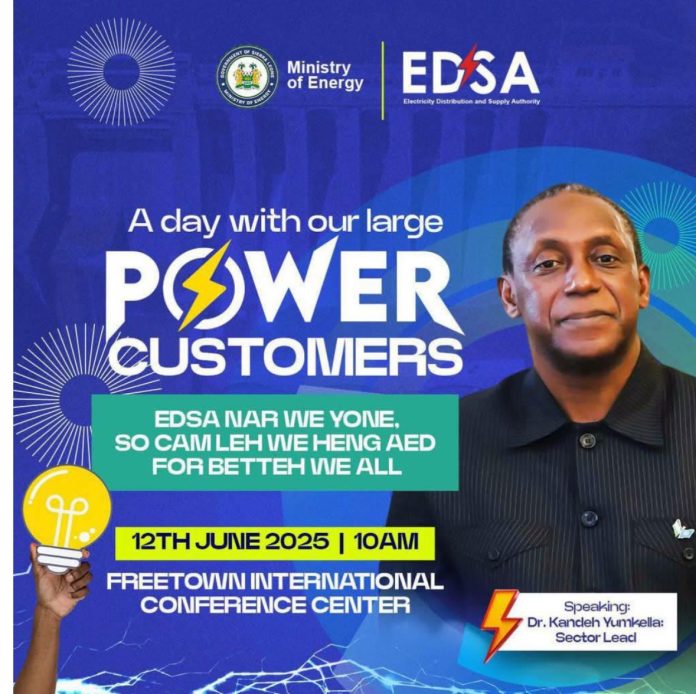AYV News, June 13, 2025
“This is a revolution, but we have to be inclusive because the change must happen,” said Dr. Kandeh Yumkella, Energy Sector Lead, as he addressed stakeholders during a critical engagement with the Electricity Distribution and Supply Authority (EDSA) and its large power consumers.
The day-long session, aimed at deepening collaboration and outlining a reform strategy, comes at a time when Sierra Leone is navigating its way out of emergency power dependence, such as the Karpowership, and aligning with President Julius Maada Bio’s national energy vision: securing affordable, reliable, and sustainable electricity for all.
Dr. Yumkella assured participants that “we are doing aggressive reforms at EDSA and we are determined under the leadership of President Bio to change the drastic losses of EDSA.” With a strong emphasis on metering verification, cutting losses, and attracting investments, Yumkella reiterated that the President is laying the groundwork for a smooth transition toward a more resilient energy sector.
“There is no need for panic,” he added, in reference to the expected Karpowership cut, noting that only 15% of Freetown’s power would be affected and significant measures will be taken to ensure that gap is cushion.
Chairman of the EDSA Board, Ing. Andrew Keilie, gave a candid update on the current state of the electricity sector, stressing the urgency for efficiency and expanded access. “We are in a very difficult position,” he admitted. Currently, the majority of power comes from thermal-based Independent Power Producers (IPPs), with minimal contributions from hydropower sources like Bumbuna. However, the pipeline of solar projects offers hope for diversification.
Chairman Keilie highlighted troubling statistics: technical and commercial losses as high as over 50%, widespread electricity theft, often in collusion with insiders, and a large outstanding debt owed to IPPs. Despite these issues, he insisted that reforms are already underway.
“We want increased and efficient access to electricity,” he said, calling on all stakeholders, particularly high-end consumers, to pay their bills, follow regulations, and desist from illegal connections and vandalism. “EDSA needs to create increased access, make electricity affordable, and commit to public information and safe practices,” he concluded.
EDSA’s Chief Financial Officer, Abu Mattai, presented the new financial processes designed to streamline billing and collections. He encouraged timely payments and compliance with formal procedures, noting that efficient financial flows are essential to maintaining and upgrading power infrastructure.
Deputy Minister 1 of the Ministry of Energy, Ing. Edmond Nonie, delivered a detailed presentation on the “Feet on the Street 2025” operations—a campaign focused on revenue normalization. He cited past technical assessments from global partners such as Tetra Tech and the Danish Energy Agency, confirming that EDSA’s unprofitability stems largely from massive system losses.
“We have 1,200 bulk smart meters ready for installation,” he announced, as part of a nationwide initiative to modernize metering and tighten control over electricity usage. He echoed President Bio’s directive: reduce losses drastically and protect the national grid from internal and external threats. “EDSA’s network is under constant attack,” he warned, emphasizing the urgent need for reforms.
Throughout the engagement, a recurring theme was shared responsibility. While government leaders and the EDSA board chart a new path forward, the cooperation of large consumers—many of whom hold significant influence over power usage and payment compliance—is vital.
“EDSA is supposed to be a business; we have to run it like a business,” Dr. Yumkella asserted. His message was clear: energy security in Sierra Leone hinges on collective action. President Bio’s vision is not just to patch the system but to transform it—ending the era of emergency contracts and ushering in a sustainable power model.
As Sierra Leone faces the immediate challenge of reduced emergency supply from the Karpowership, this engagement marks a pivotal moment: a shift from crisis management to long-term reform. The foundation is being laid—through accountability, innovation, and strategic leadership—to finally place the nation’s energy future firmly in its own hands.
The engagement ended with an interactive questions and answers session where high-end customers of EDSA asked series of questions and raised their concerns. Senior management level at the Ministry of Energy and EDSA provided satisfying answers to their questions and concerns.

